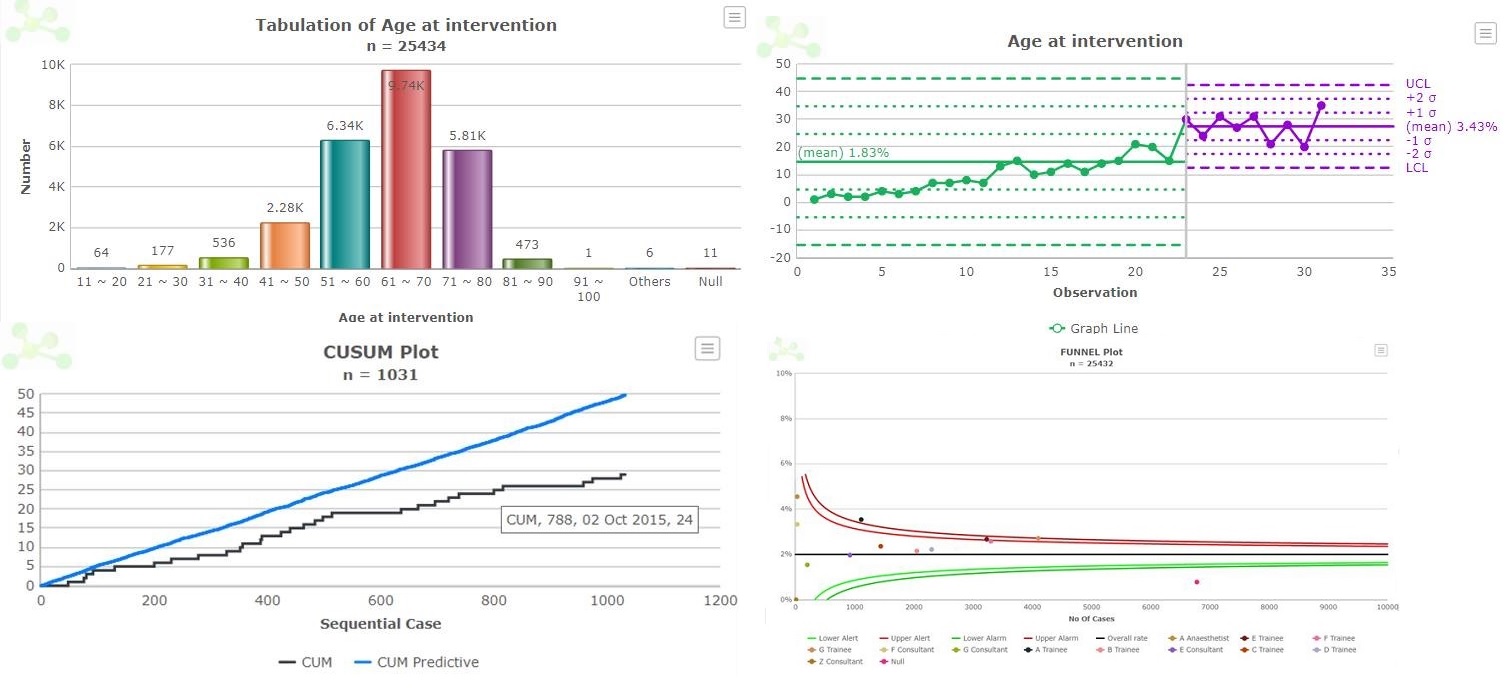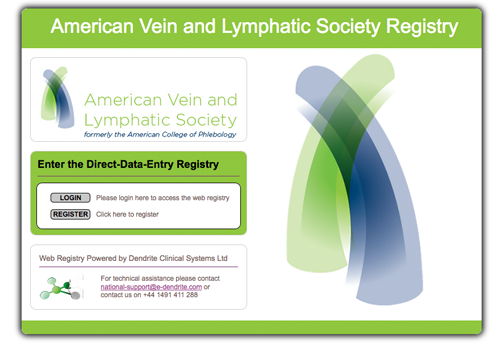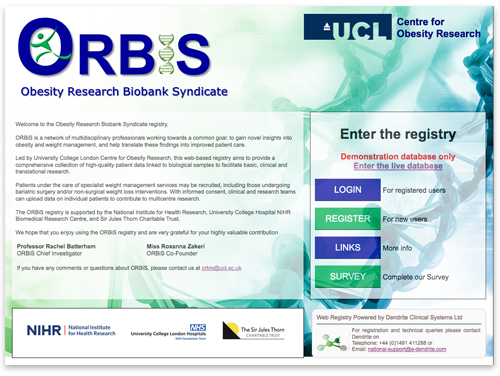
Hospital Systems
Dendrite enables clinicians to create and manage their own databases to collect, analyse and report local data – for clinical audit, research and benchmarking to track and improve clinical practice and outcomes. Dendrite’s clinical database system can be used by individual departments (e.g. to track a particular patient cohort or procedure) as well as for multi-disciplinary teams and departments tracking patients along the treatment pathway.
Translating data into meaningful insights
Collecting good quality data is important, but converting this into meaningful insights is where the real value lies. Dendrite’s Intellect system makes the analysis and reporting of data simple and clinically meaningful. The system includes inbuilt clinical outcome tracking software, providing users with the ability to track time-related clinical data for analysis of clinical events (e.g. referral, clinic visit, diagnosis, procedure, follow-up), all within a single software environment. Through the use of in-built risk stratification algorithms clinicians can benchmark their results against national and international standards, adjusted for severity of illness using well-established statistical methods.
Flexible, innovative and intuitive solutions
Built to work within almost any imaginable clinical scenario and designed to support multiple specialties, Dendrite’s system can be customised through the creation of structured clinical datasets de novo. Customers have access to an extensive library of existing clinical databases for various specialties that can be loaded and adapted for your local data collection, analysis and reporting. Many of the datasets in the library are based on nationally defined designs and definitions and are kept up-to-date by Dendrite.
Integration with other systems
Dendrite’s clinical database system is highly interoperable and can be integrated with other hospital systems to automatically capture and validate relevant data (e.g. patient demographic, ADT data, laboratory, pathology etc). Dendrite supports all of the standard data transfer protocols and have a highly skilled and experienced team of software support programmers that can intelligently select the appropriate piece of data to include in the clinical record.
Data transfers can be bi-directional to allow interactive communication, eg. email requests for PROMS with on-line responses.
Clinical documents can be passed directly to the EPR or document management systems to save clinical time.
Unique data analysis and reporting
Dendrite’s clinical database system includes four types of analytics and reports:
1. Integrated data analysis tools.
2. Visual dashboard (example below).
3. Data export and filtering.
4. Direct ODBC connection with industry standard reporting tools, eg. Microsoft SRS, Crystal Reports.
5. Clinical documents such as operation notes and discharge summaries.

Dendrite’s unique flexible data analysis tools allow users to easily build their own visual analysis graphs with their data including:
- Creating patient cohorts
- Building (and saving) new graphs
- Modifying existing graphs (excluding/filtering data)
- Automatically calculating key statistical values (e.g. median, σ, percentile, shift, etc.)
- Saving and exporting graphs/tables in various formats (PDF, PNG, JPG, SVG and XLS) e.g. for reports, presentations.
This tool covers different types of graphs, including:
- Distribution analysis (analysis by one field, e.g. age distribution)
- Cross-tabulation (analysis by two fields, e.g. age by gender)
- Multi-cohort analysis (graphs combining multiple cohorts)
- Run analysis
- Shewhart analysis
- XmR
- CUSUM analysis
- VLAD
- Actuarial curves
- Funnel plots
- Timelines
- Events analysis
- Advanced analysis
Please contact us for a system demonstration.
 Dendrite Clinical Systems is pleased to announce the prestigious journal, Obesity Surgery, has published a paper highlighting international bariatric surgery practice from the 4th Dendrite/IFSO Global Registry Report. The paper, ‘Bariatric Surgery Worldwide: Baseline Demographic Description and One-Year Outcomes from the Fourth Dendrite/IFSO Global Registry Report 2018’, (Himpens et al. Obesity Surgery. March 2019.
Dendrite Clinical Systems is pleased to announce the prestigious journal, Obesity Surgery, has published a paper highlighting international bariatric surgery practice from the 4th Dendrite/IFSO Global Registry Report. The paper, ‘Bariatric Surgery Worldwide: Baseline Demographic Description and One-Year Outcomes from the Fourth Dendrite/IFSO Global Registry Report 2018’, (Himpens et al. Obesity Surgery. March 2019. Dendrite Clinical Systems and The State of Kuwait Ministry of Health,
Dendrite Clinical Systems and The State of Kuwait Ministry of Health, Dendrite Clinical Systems and The American Vein and Lymphatic Society (formerly the American College of Phlebology) are delighted to announce the launch of the American Vein and Lymphatic Society Registry - a ‘real-time’ clinical database that will identify practice patterns for venous and lymphatic disease diagnosis and treatment across North America.
Dendrite Clinical Systems and The American Vein and Lymphatic Society (formerly the American College of Phlebology) are delighted to announce the launch of the American Vein and Lymphatic Society Registry - a ‘real-time’ clinical database that will identify practice patterns for venous and lymphatic disease diagnosis and treatment across North America. Dendrite Clinical Systems and the Society for Cardiothoracic Surgery in the UK are pleased to announce the SCTS Conference News 2019 newspaper is now available to view/download. This is the fourth successive year Dendrite has published the newspaper on behalf of the SCTS. The newspaper reports a multitude of presentations from the meeting including the latest and the best information on new technologies and techniques in cardio-thoracic surgery.
Dendrite Clinical Systems and the Society for Cardiothoracic Surgery in the UK are pleased to announce the SCTS Conference News 2019 newspaper is now available to view/download. This is the fourth successive year Dendrite has published the newspaper on behalf of the SCTS. The newspaper reports a multitude of presentations from the meeting including the latest and the best information on new technologies and techniques in cardio-thoracic surgery.  Dendrite Clinical Systems, the publisher of Bariatric News, is pleased to announce issue 39 of the newspaper is now available to view/download. The newspaper reports on research, technology, events and policy in the bariatric specialty, the latest clinical studies, policy changes and product news, the latest meetings and events, interviews prominent bariatric experts, and host debates between specialists on controversial topics.
Dendrite Clinical Systems, the publisher of Bariatric News, is pleased to announce issue 39 of the newspaper is now available to view/download. The newspaper reports on research, technology, events and policy in the bariatric specialty, the latest clinical studies, policy changes and product news, the latest meetings and events, interviews prominent bariatric experts, and host debates between specialists on controversial topics. Dendrite Clinical Systems in pleased to announce its clinical database system has been selected to collect, record and analyse data from the Obesity Research Biobank Syndicate (ORBiS) Registry. ORBiS is a network of multidisciplinary professionals working towards a common goal: to gain novel insights into obesity and weight management, and help translate these findings into improved patient care.
Dendrite Clinical Systems in pleased to announce its clinical database system has been selected to collect, record and analyse data from the Obesity Research Biobank Syndicate (ORBiS) Registry. ORBiS is a network of multidisciplinary professionals working towards a common goal: to gain novel insights into obesity and weight management, and help translate these findings into improved patient care. 


